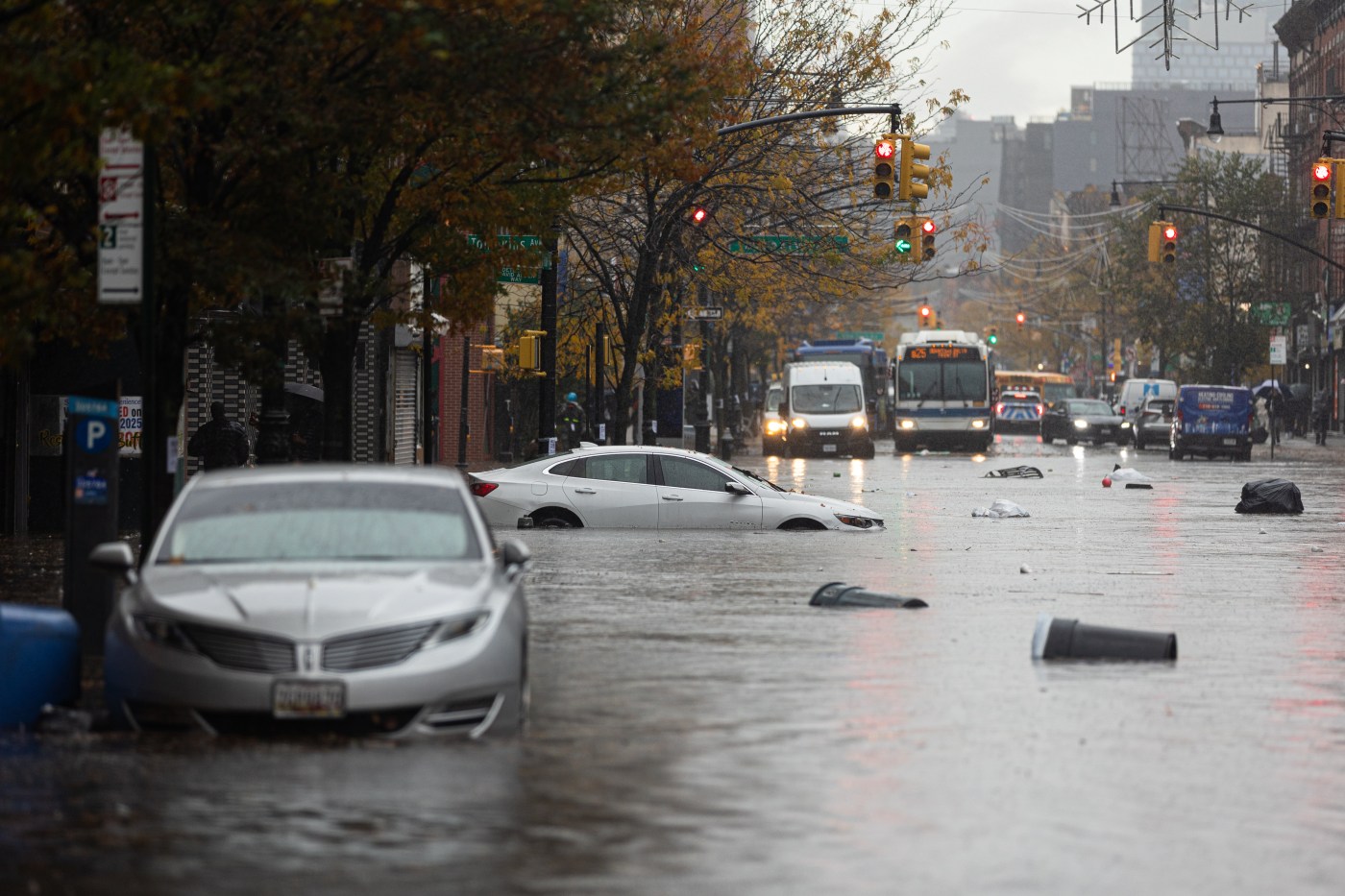Politics
New York City Faces Flash Flooding After Storm, Residents Respond

Flash flooding swept across all boroughs of New York City following a severe rainstorm last week, leading to tragic fatalities and significant property damage. In total, two lives were lost due to the flooding, with downed trees causing extensive disruption. Residents reported blocked sidewalks and streets, highlighting the immediate impact on daily life.
One resident from Queens, Atul Karnik, described a large tree that fell in his neighborhood, obstructing pedestrian paths and bicycle routes. Fortunately, no injuries were reported. Karnik praised the city’s swift response, noting that the NYC Department of Parks & Recreation had cleared the tree by the following Monday morning, just days after the storm. “I’m in full admiration of the efficiency of the Parks Department,” he stated, commending their work amid the crisis.
Climate Concerns and Political Responses
The flooding incident has sparked discussions about climate resilience in the city. Fresh Meadows resident Sara Rebecca Storch expressed her agreement with an op-ed emphasizing the need for future mayors to prioritize climate issues. She highlighted the importance of Zohran Mamdani’s commitment to making the city more livable and affordable, especially for the most vulnerable communities.
Storch pointed to the potential for improvements in resilience through collaboration with the City Council. She mentioned Local Law 97, which aims to enhance building efficiency, and the state’s All-Electric Building Act, which could mandate new constructions without gas connections. “Mamdani will need a close relationship with Governor Hochul, as the state controls the permitting process for clean energy and grid improvements,” Storch noted.
Conversely, questions remain regarding the implementation of Local Law 97, particularly for older buildings. Sunnyside resident Simon Cohen raised concerns about the practicality of the law, asking for specifics on prototypes, timelines, costs, and the impact on current residents during construction.
Mixed Reactions to Mayoral Candidacy
As the political landscape shifts, opinions on Mamdani’s candidacy for mayor vary widely. Bronx resident Marion Friedman reacted strongly against Mamdani’s platform, expressing fears that the election results could signal a radical shift in the city’s governance. “The once-greatest city in the world being taken over by radical left-wing loonies? Yes way,” Friedman lamented.
Similarly, Nyack resident Stephen Boyle countered claims of Mamdani being a communist or socialist, asserting that genuine socialism is often misconstrued. He drew parallels with current political leaders, suggesting that economic power remains concentrated, regardless of the governing system.
Calls for wise leadership also emerged, with Bronx resident Maria Bonsanti urging Mamdani to seek advice from experienced political figures, including former Governor Andrew Cuomo. “Why not? They all love New York City,” she proposed.
The editorial board of a local publication raised concerns about Mamdani’s stance on antisemitism, with a Florida resident warning against perceived threats. The resident drew historical parallels, suggesting that political rhetoric could lead to dire consequences.
In contrast, Bronx resident Richie Nagan defended the importance of separating criticism of Israel from antisemitism, arguing that such critiques are essential for political discourse.
Future Outlook and Political Engagement
As New York City navigates the aftermath of this flooding and the implications of its recent elections, discussions about governance, climate action, and community safety are gaining momentum. Manhattan resident Michael Malewich interpreted the election results as a sign of shifting political tides, suggesting that they could foreshadow broader changes in the upcoming congressional elections.
Francesca Fortunato from Manhattan emphasized the need for Democrats to remain vigilant against opposition pressures, particularly regarding healthcare access. “Allowing millions of Americans to lose their health care is not acceptable,” she asserted, calling for continued advocacy against proposed cuts.
The recent storm and its aftermath have not only highlighted the city’s vulnerabilities but have also sparked a broader dialogue about the need for resilient policies and responsible governance as residents grapple with their expectations for the future.
-

 Science3 weeks ago
Science3 weeks agoIROS 2025 to Showcase Cutting-Edge Robotics Innovations in China
-

 Lifestyle3 weeks ago
Lifestyle3 weeks agoStone Island’s Logo Worn by Extremists Sparks Brand Dilemma
-

 Politics3 weeks ago
Politics3 weeks agoJudge Considers Dismissal of Chelsea Housing Case Citing AI Flaws
-

 World3 weeks ago
World3 weeks agoBravo Company Veterans Honored with Bronze Medals After 56 Years
-

 Health3 weeks ago
Health3 weeks agoStartup Liberate Bio Secures $31 Million for Next-Gen Therapies
-

 Health3 weeks ago
Health3 weeks agoTop Hyaluronic Acid Serums for Radiant Skin in 2025
-

 Sports3 weeks ago
Sports3 weeks agoMel Kiper Jr. Reveals Top 25 Prospects for 2026 NFL Draft
-

 Science3 weeks ago
Science3 weeks agoArizona State University Transforms Programming Education Approach
-

 Top Stories3 weeks ago
Top Stories3 weeks agoIndonesia Suspends 27,000 Bank Accounts in Online Gambling Crackdown
-

 Lifestyle3 weeks ago
Lifestyle3 weeks agoMary Morgan Jackson Crowned Little Miss National Peanut Festival 2025
-

 World3 weeks ago
World3 weeks agoHoneywell Predicts Record Demand for Business Jets Over Next Decade
-

 Sports3 weeks ago
Sports3 weeks agoYamamoto’s Mastery Leads Dodgers to 5-1 Victory in NLCS Game 2









